Coaching Strategy: Case Study Analysis for Leadership Module
VerifiedAdded on 2022/11/11
|7
|1870
|495
Case Study
AI Summary
This case study analyzes coaching strategies within an organizational context, addressing key aspects such as identifying the need for coaching through various sources like annual reports and employee feedback. It outlines the components of a coaching strategy, including joint planning, observation, action, feedback, and reflection, emphasizing their basis on organizational performance data. The assignment explores the roles and responsibilities of individuals involved in a coaching program, including business coach trainers and managers, and details the roles of a coach in mentoring and guiding employees. It identifies stakeholders like employees, managers, and consumers, who contribute to developing coaching timelines. The study also covers various coaching methods, such as employee training and mentoring, alongside relevant legal and regulatory compliance requirements, including work health and safety. Furthermore, it discusses criteria for matching coaches and trainees, professional development activities for coaches, and practical methods for monitoring coaching relationships, such as weekly reviews and journal entries. The study provides a comprehensive overview of coaching strategies for effective leadership and organizational development.
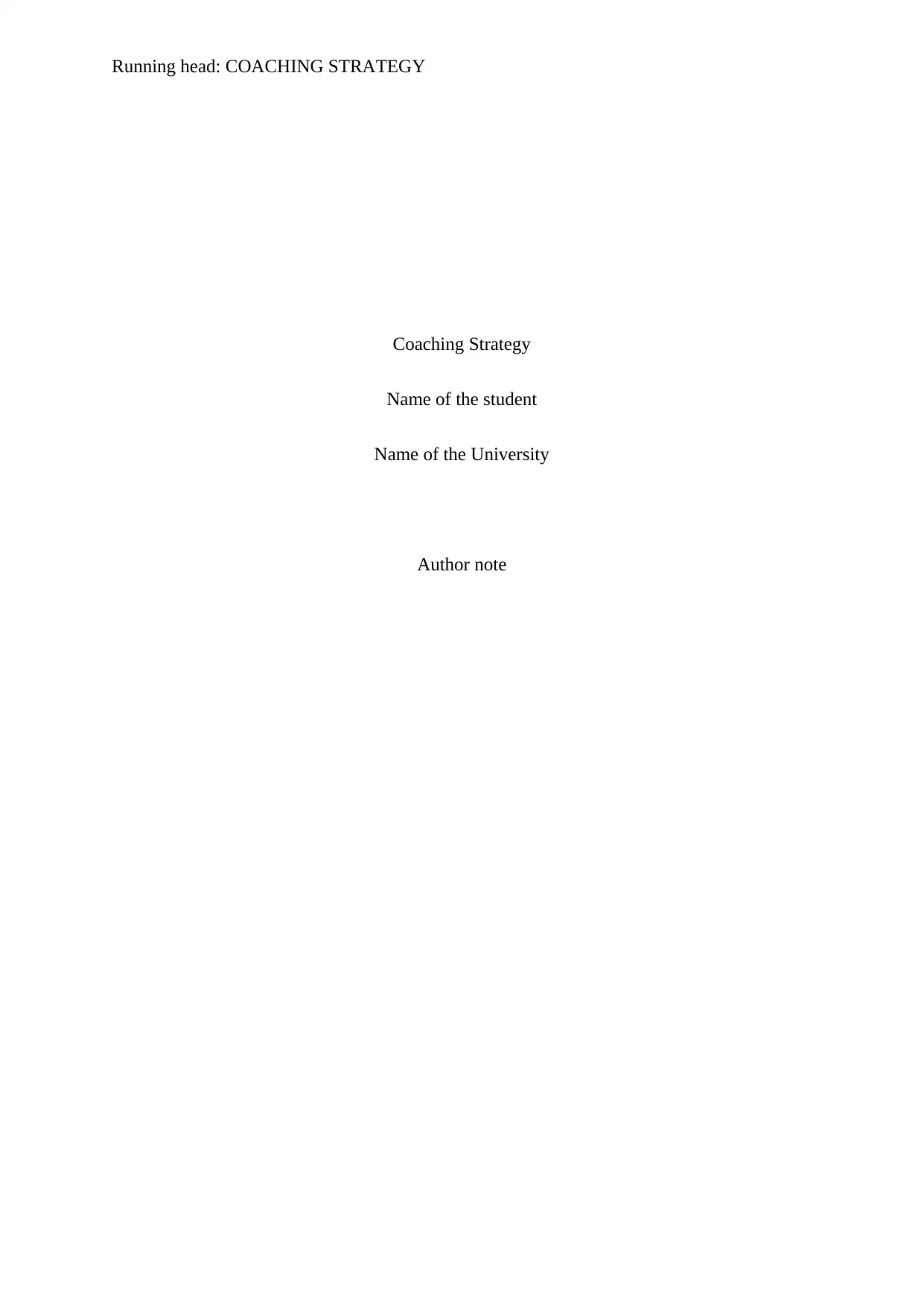
Running head: COACHING STRATEGY
Coaching Strategy
Name of the student
Name of the University
Author note
Coaching Strategy
Name of the student
Name of the University
Author note
Paraphrase This Document
Need a fresh take? Get an instant paraphrase of this document with our AI Paraphraser
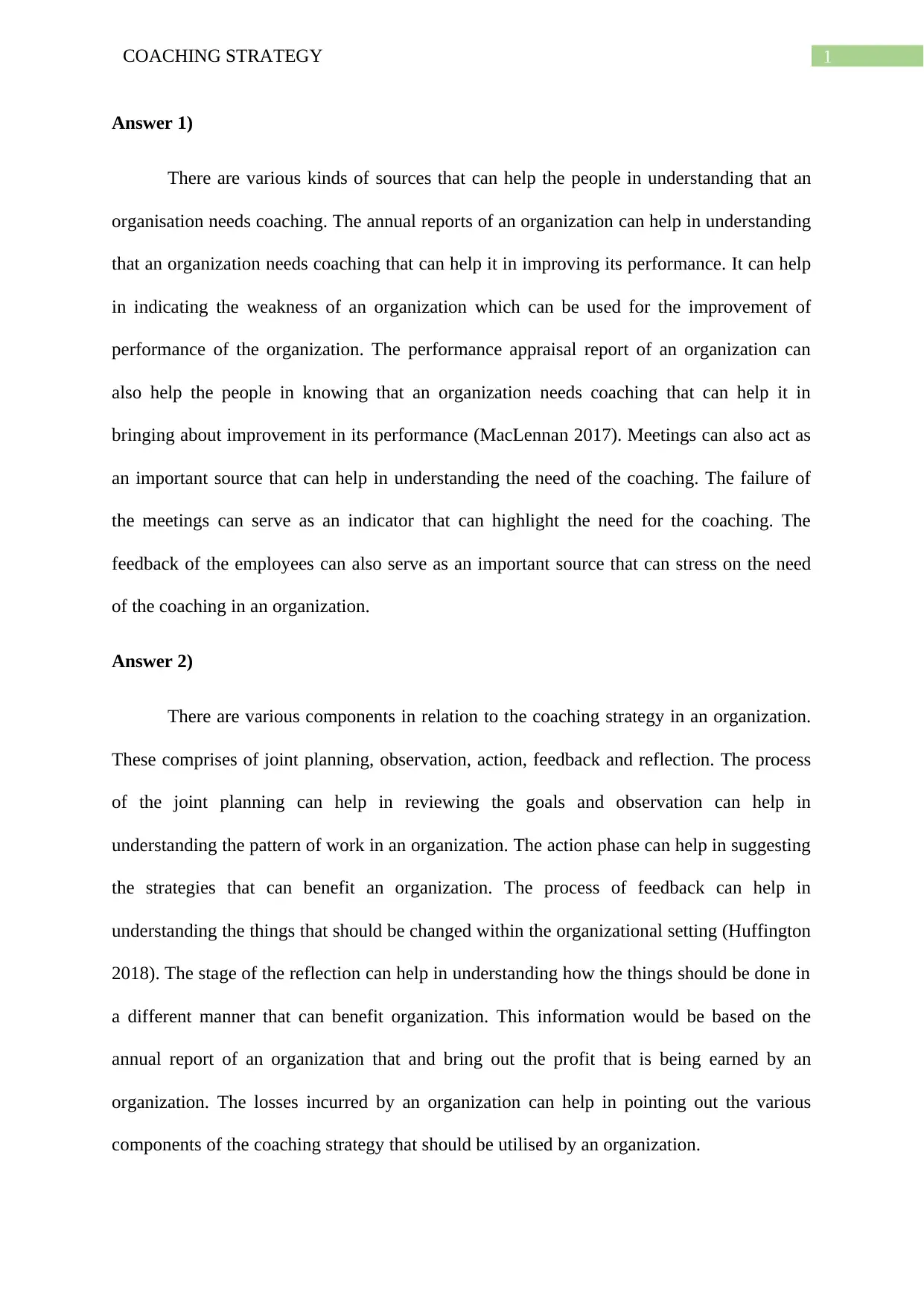
1COACHING STRATEGY
Answer 1)
There are various kinds of sources that can help the people in understanding that an
organisation needs coaching. The annual reports of an organization can help in understanding
that an organization needs coaching that can help it in improving its performance. It can help
in indicating the weakness of an organization which can be used for the improvement of
performance of the organization. The performance appraisal report of an organization can
also help the people in knowing that an organization needs coaching that can help it in
bringing about improvement in its performance (MacLennan 2017). Meetings can also act as
an important source that can help in understanding the need of the coaching. The failure of
the meetings can serve as an indicator that can highlight the need for the coaching. The
feedback of the employees can also serve as an important source that can stress on the need
of the coaching in an organization.
Answer 2)
There are various components in relation to the coaching strategy in an organization.
These comprises of joint planning, observation, action, feedback and reflection. The process
of the joint planning can help in reviewing the goals and observation can help in
understanding the pattern of work in an organization. The action phase can help in suggesting
the strategies that can benefit an organization. The process of feedback can help in
understanding the things that should be changed within the organizational setting (Huffington
2018). The stage of the reflection can help in understanding how the things should be done in
a different manner that can benefit organization. This information would be based on the
annual report of an organization that and bring out the profit that is being earned by an
organization. The losses incurred by an organization can help in pointing out the various
components of the coaching strategy that should be utilised by an organization.
Answer 1)
There are various kinds of sources that can help the people in understanding that an
organisation needs coaching. The annual reports of an organization can help in understanding
that an organization needs coaching that can help it in improving its performance. It can help
in indicating the weakness of an organization which can be used for the improvement of
performance of the organization. The performance appraisal report of an organization can
also help the people in knowing that an organization needs coaching that can help it in
bringing about improvement in its performance (MacLennan 2017). Meetings can also act as
an important source that can help in understanding the need of the coaching. The failure of
the meetings can serve as an indicator that can highlight the need for the coaching. The
feedback of the employees can also serve as an important source that can stress on the need
of the coaching in an organization.
Answer 2)
There are various components in relation to the coaching strategy in an organization.
These comprises of joint planning, observation, action, feedback and reflection. The process
of the joint planning can help in reviewing the goals and observation can help in
understanding the pattern of work in an organization. The action phase can help in suggesting
the strategies that can benefit an organization. The process of feedback can help in
understanding the things that should be changed within the organizational setting (Huffington
2018). The stage of the reflection can help in understanding how the things should be done in
a different manner that can benefit organization. This information would be based on the
annual report of an organization that and bring out the profit that is being earned by an
organization. The losses incurred by an organization can help in pointing out the various
components of the coaching strategy that should be utilised by an organization.
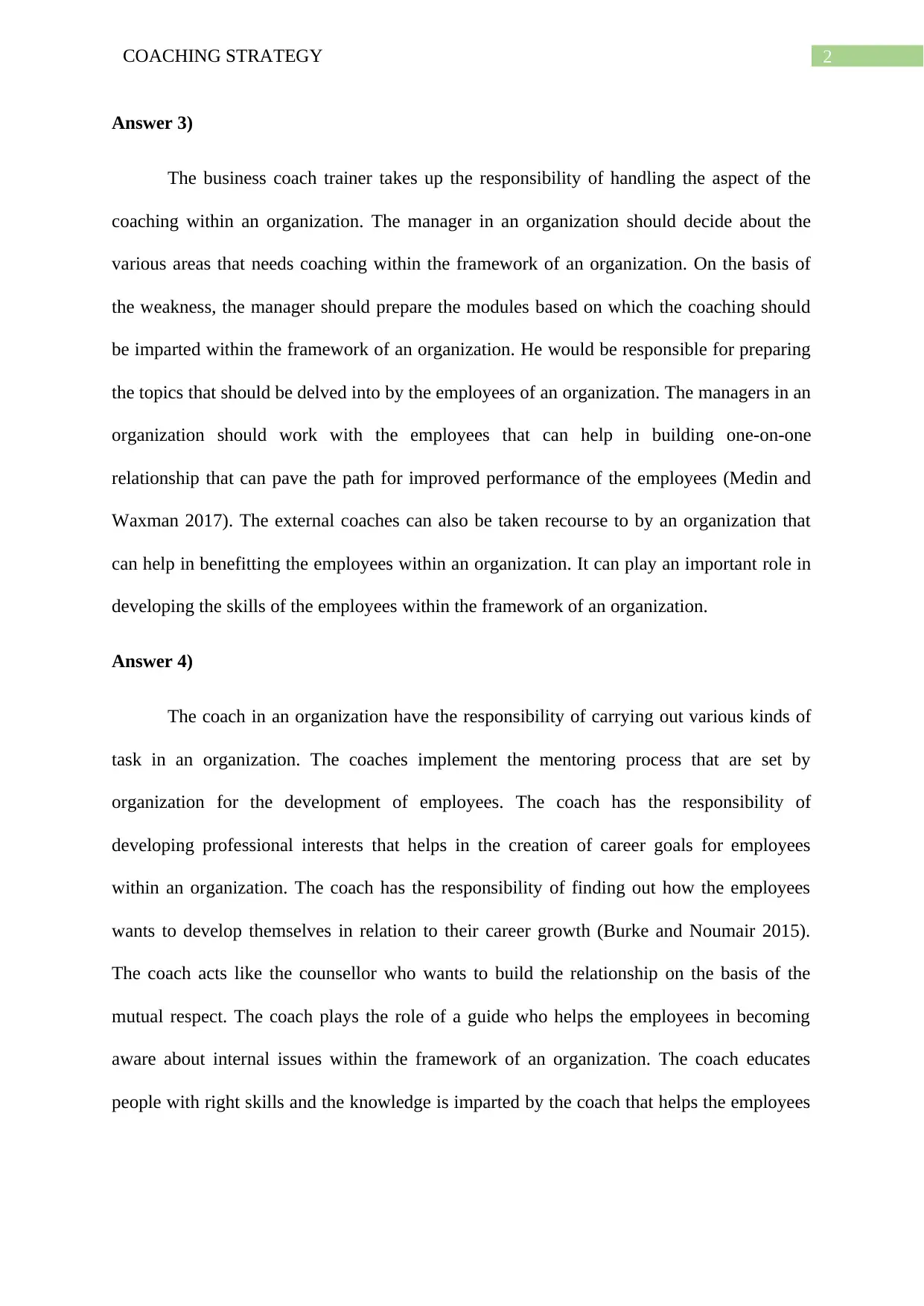
2COACHING STRATEGY
Answer 3)
The business coach trainer takes up the responsibility of handling the aspect of the
coaching within an organization. The manager in an organization should decide about the
various areas that needs coaching within the framework of an organization. On the basis of
the weakness, the manager should prepare the modules based on which the coaching should
be imparted within the framework of an organization. He would be responsible for preparing
the topics that should be delved into by the employees of an organization. The managers in an
organization should work with the employees that can help in building one-on-one
relationship that can pave the path for improved performance of the employees (Medin and
Waxman 2017). The external coaches can also be taken recourse to by an organization that
can help in benefitting the employees within an organization. It can play an important role in
developing the skills of the employees within the framework of an organization.
Answer 4)
The coach in an organization have the responsibility of carrying out various kinds of
task in an organization. The coaches implement the mentoring process that are set by
organization for the development of employees. The coach has the responsibility of
developing professional interests that helps in the creation of career goals for employees
within an organization. The coach has the responsibility of finding out how the employees
wants to develop themselves in relation to their career growth (Burke and Noumair 2015).
The coach acts like the counsellor who wants to build the relationship on the basis of the
mutual respect. The coach plays the role of a guide who helps the employees in becoming
aware about internal issues within the framework of an organization. The coach educates
people with right skills and the knowledge is imparted by the coach that helps the employees
Answer 3)
The business coach trainer takes up the responsibility of handling the aspect of the
coaching within an organization. The manager in an organization should decide about the
various areas that needs coaching within the framework of an organization. On the basis of
the weakness, the manager should prepare the modules based on which the coaching should
be imparted within the framework of an organization. He would be responsible for preparing
the topics that should be delved into by the employees of an organization. The managers in an
organization should work with the employees that can help in building one-on-one
relationship that can pave the path for improved performance of the employees (Medin and
Waxman 2017). The external coaches can also be taken recourse to by an organization that
can help in benefitting the employees within an organization. It can play an important role in
developing the skills of the employees within the framework of an organization.
Answer 4)
The coach in an organization have the responsibility of carrying out various kinds of
task in an organization. The coaches implement the mentoring process that are set by
organization for the development of employees. The coach has the responsibility of
developing professional interests that helps in the creation of career goals for employees
within an organization. The coach has the responsibility of finding out how the employees
wants to develop themselves in relation to their career growth (Burke and Noumair 2015).
The coach acts like the counsellor who wants to build the relationship on the basis of the
mutual respect. The coach plays the role of a guide who helps the employees in becoming
aware about internal issues within the framework of an organization. The coach educates
people with right skills and the knowledge is imparted by the coach that helps the employees
⊘ This is a preview!⊘
Do you want full access?
Subscribe today to unlock all pages.

Trusted by 1+ million students worldwide
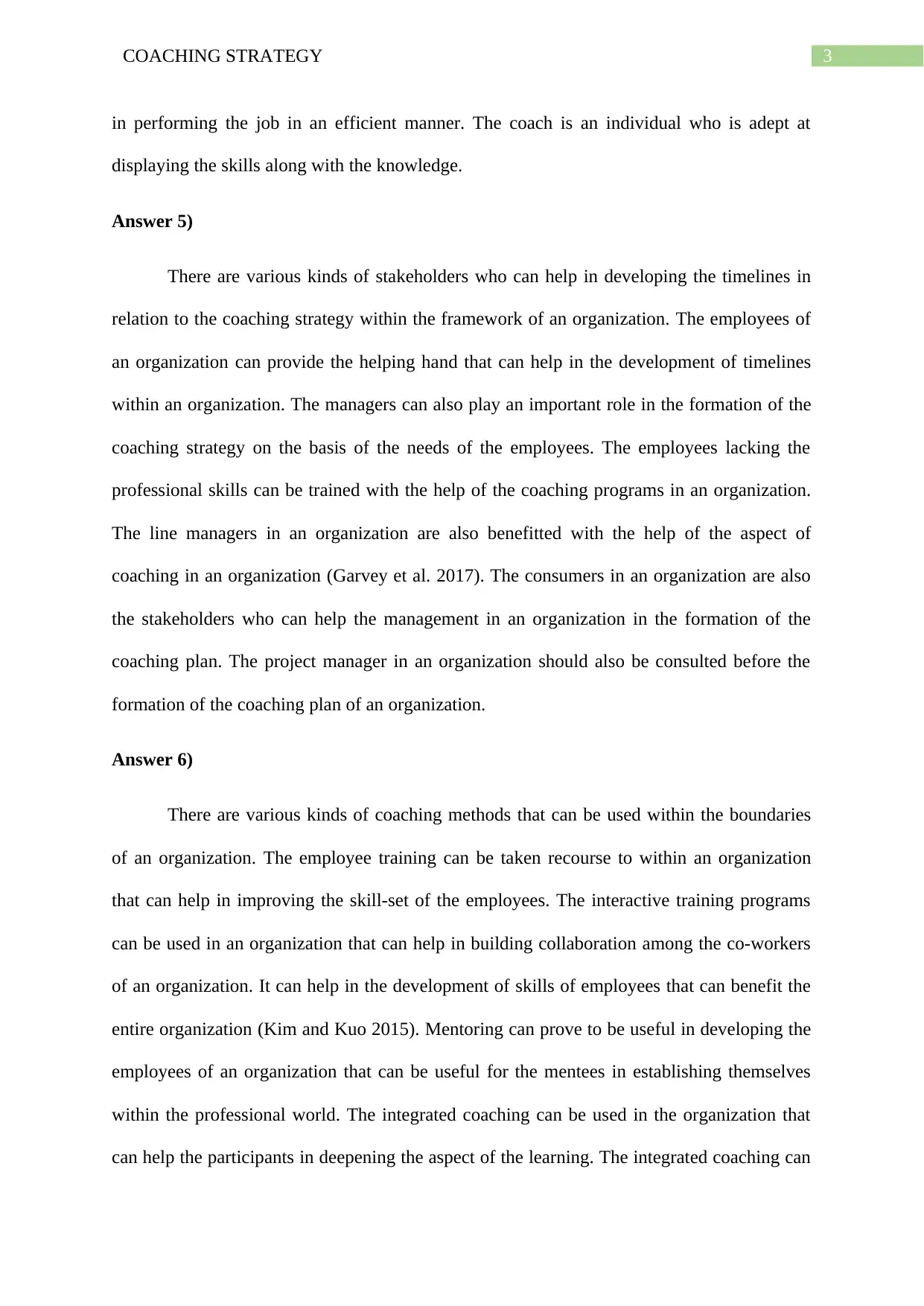
3COACHING STRATEGY
in performing the job in an efficient manner. The coach is an individual who is adept at
displaying the skills along with the knowledge.
Answer 5)
There are various kinds of stakeholders who can help in developing the timelines in
relation to the coaching strategy within the framework of an organization. The employees of
an organization can provide the helping hand that can help in the development of timelines
within an organization. The managers can also play an important role in the formation of the
coaching strategy on the basis of the needs of the employees. The employees lacking the
professional skills can be trained with the help of the coaching programs in an organization.
The line managers in an organization are also benefitted with the help of the aspect of
coaching in an organization (Garvey et al. 2017). The consumers in an organization are also
the stakeholders who can help the management in an organization in the formation of the
coaching plan. The project manager in an organization should also be consulted before the
formation of the coaching plan of an organization.
Answer 6)
There are various kinds of coaching methods that can be used within the boundaries
of an organization. The employee training can be taken recourse to within an organization
that can help in improving the skill-set of the employees. The interactive training programs
can be used in an organization that can help in building collaboration among the co-workers
of an organization. It can help in the development of skills of employees that can benefit the
entire organization (Kim and Kuo 2015). Mentoring can prove to be useful in developing the
employees of an organization that can be useful for the mentees in establishing themselves
within the professional world. The integrated coaching can be used in the organization that
can help the participants in deepening the aspect of the learning. The integrated coaching can
in performing the job in an efficient manner. The coach is an individual who is adept at
displaying the skills along with the knowledge.
Answer 5)
There are various kinds of stakeholders who can help in developing the timelines in
relation to the coaching strategy within the framework of an organization. The employees of
an organization can provide the helping hand that can help in the development of timelines
within an organization. The managers can also play an important role in the formation of the
coaching strategy on the basis of the needs of the employees. The employees lacking the
professional skills can be trained with the help of the coaching programs in an organization.
The line managers in an organization are also benefitted with the help of the aspect of
coaching in an organization (Garvey et al. 2017). The consumers in an organization are also
the stakeholders who can help the management in an organization in the formation of the
coaching plan. The project manager in an organization should also be consulted before the
formation of the coaching plan of an organization.
Answer 6)
There are various kinds of coaching methods that can be used within the boundaries
of an organization. The employee training can be taken recourse to within an organization
that can help in improving the skill-set of the employees. The interactive training programs
can be used in an organization that can help in building collaboration among the co-workers
of an organization. It can help in the development of skills of employees that can benefit the
entire organization (Kim and Kuo 2015). Mentoring can prove to be useful in developing the
employees of an organization that can be useful for the mentees in establishing themselves
within the professional world. The integrated coaching can be used in the organization that
can help the participants in deepening the aspect of the learning. The integrated coaching can
Paraphrase This Document
Need a fresh take? Get an instant paraphrase of this document with our AI Paraphraser

4COACHING STRATEGY
help the employees in the short term that can help them in the identification of their weakness
(MacLennan 2017).
Answer 7)
There are various kinds of legislations along with the regulations that should be taken
into consideration in the formation of the training program in an organization. The employer
should take into consideration the work health along with the safety training that can play an
important role in keeping the workplace safe for the employees of an organization
(Business.qld.gov.au 2019). The employees of an organization should be provided with the
fire along with the emergency training that can help in the proper evaluation of staff in an
organization. A business owner in Australia as the obligation of ensuring the safety of a
person in the case of a fire in the building or in any other kind of emergency. The coaches in
an organization should be trained in the area of Personal Protective Equipment that can keep
the employees safe in the event of doing the jobs. The compliance requirements in relation to
the training program pertains to not being discriminated on the grounds of age. The aspect of
the discrimination is covered with the help of federal law along with the company policy.
Answer 8)
There are different kinds of criteria that can be used that can help in matching the
coaches with the trainees. The business coach should focus on building relationship that can
help in aligning the coaches with that of the trainees. The coach should provide the
assessment that can help the employees in gaining the self-awareness (Schein 2015). The
coach should have the challenging thinking along with the assumptions that can help in
encouraging the aspect of the risk-thinking an an organization. The leader should support and
drive the results that can help in matching the mind set of the coaches with that of the trainees
within an organization.
help the employees in the short term that can help them in the identification of their weakness
(MacLennan 2017).
Answer 7)
There are various kinds of legislations along with the regulations that should be taken
into consideration in the formation of the training program in an organization. The employer
should take into consideration the work health along with the safety training that can play an
important role in keeping the workplace safe for the employees of an organization
(Business.qld.gov.au 2019). The employees of an organization should be provided with the
fire along with the emergency training that can help in the proper evaluation of staff in an
organization. A business owner in Australia as the obligation of ensuring the safety of a
person in the case of a fire in the building or in any other kind of emergency. The coaches in
an organization should be trained in the area of Personal Protective Equipment that can keep
the employees safe in the event of doing the jobs. The compliance requirements in relation to
the training program pertains to not being discriminated on the grounds of age. The aspect of
the discrimination is covered with the help of federal law along with the company policy.
Answer 8)
There are different kinds of criteria that can be used that can help in matching the
coaches with the trainees. The business coach should focus on building relationship that can
help in aligning the coaches with that of the trainees. The coach should provide the
assessment that can help the employees in gaining the self-awareness (Schein 2015). The
coach should have the challenging thinking along with the assumptions that can help in
encouraging the aspect of the risk-thinking an an organization. The leader should support and
drive the results that can help in matching the mind set of the coaches with that of the trainees
within an organization.
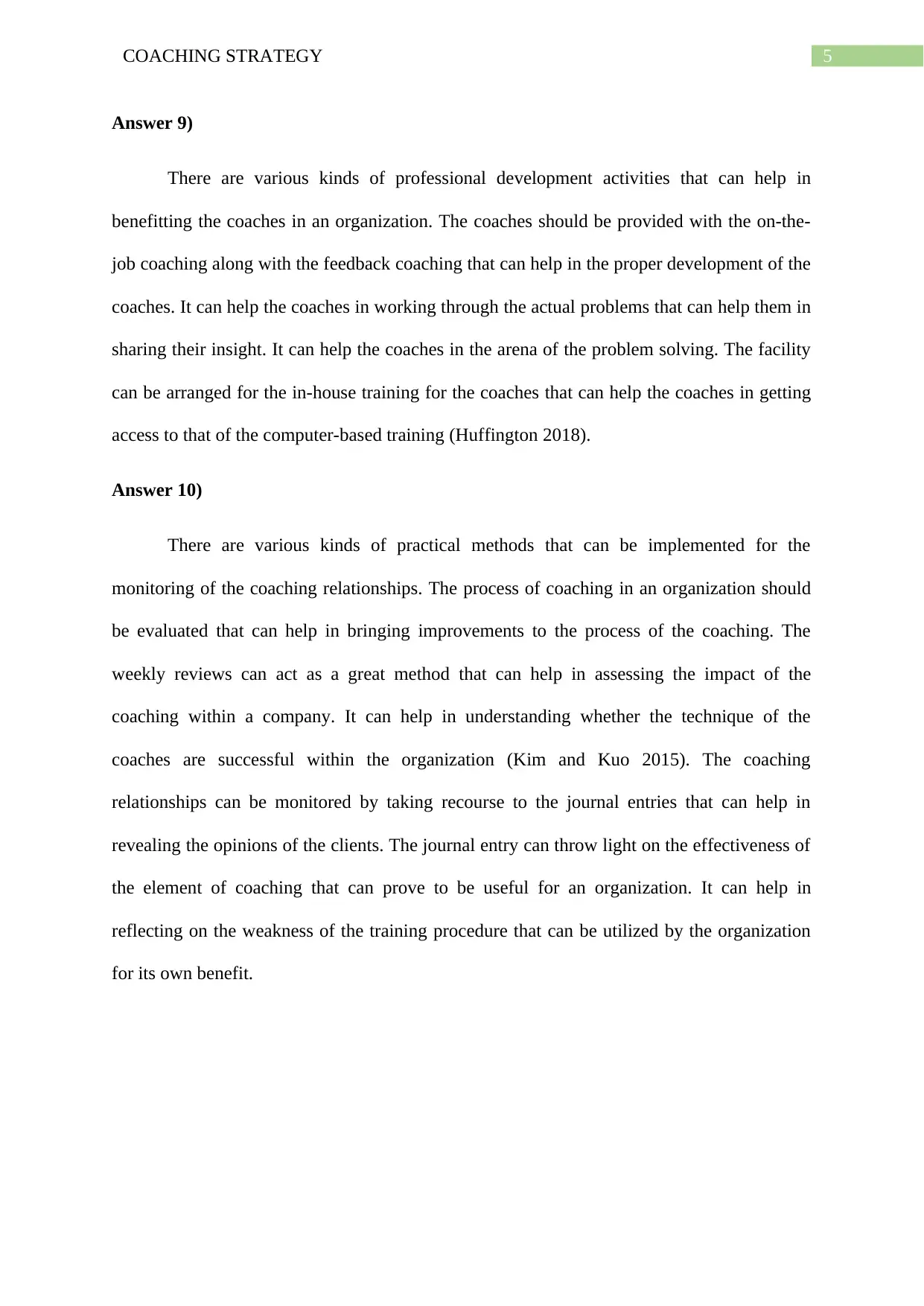
5COACHING STRATEGY
Answer 9)
There are various kinds of professional development activities that can help in
benefitting the coaches in an organization. The coaches should be provided with the on-the-
job coaching along with the feedback coaching that can help in the proper development of the
coaches. It can help the coaches in working through the actual problems that can help them in
sharing their insight. It can help the coaches in the arena of the problem solving. The facility
can be arranged for the in-house training for the coaches that can help the coaches in getting
access to that of the computer-based training (Huffington 2018).
Answer 10)
There are various kinds of practical methods that can be implemented for the
monitoring of the coaching relationships. The process of coaching in an organization should
be evaluated that can help in bringing improvements to the process of the coaching. The
weekly reviews can act as a great method that can help in assessing the impact of the
coaching within a company. It can help in understanding whether the technique of the
coaches are successful within the organization (Kim and Kuo 2015). The coaching
relationships can be monitored by taking recourse to the journal entries that can help in
revealing the opinions of the clients. The journal entry can throw light on the effectiveness of
the element of coaching that can prove to be useful for an organization. It can help in
reflecting on the weakness of the training procedure that can be utilized by the organization
for its own benefit.
Answer 9)
There are various kinds of professional development activities that can help in
benefitting the coaches in an organization. The coaches should be provided with the on-the-
job coaching along with the feedback coaching that can help in the proper development of the
coaches. It can help the coaches in working through the actual problems that can help them in
sharing their insight. It can help the coaches in the arena of the problem solving. The facility
can be arranged for the in-house training for the coaches that can help the coaches in getting
access to that of the computer-based training (Huffington 2018).
Answer 10)
There are various kinds of practical methods that can be implemented for the
monitoring of the coaching relationships. The process of coaching in an organization should
be evaluated that can help in bringing improvements to the process of the coaching. The
weekly reviews can act as a great method that can help in assessing the impact of the
coaching within a company. It can help in understanding whether the technique of the
coaches are successful within the organization (Kim and Kuo 2015). The coaching
relationships can be monitored by taking recourse to the journal entries that can help in
revealing the opinions of the clients. The journal entry can throw light on the effectiveness of
the element of coaching that can prove to be useful for an organization. It can help in
reflecting on the weakness of the training procedure that can be utilized by the organization
for its own benefit.
⊘ This is a preview!⊘
Do you want full access?
Subscribe today to unlock all pages.

Trusted by 1+ million students worldwide
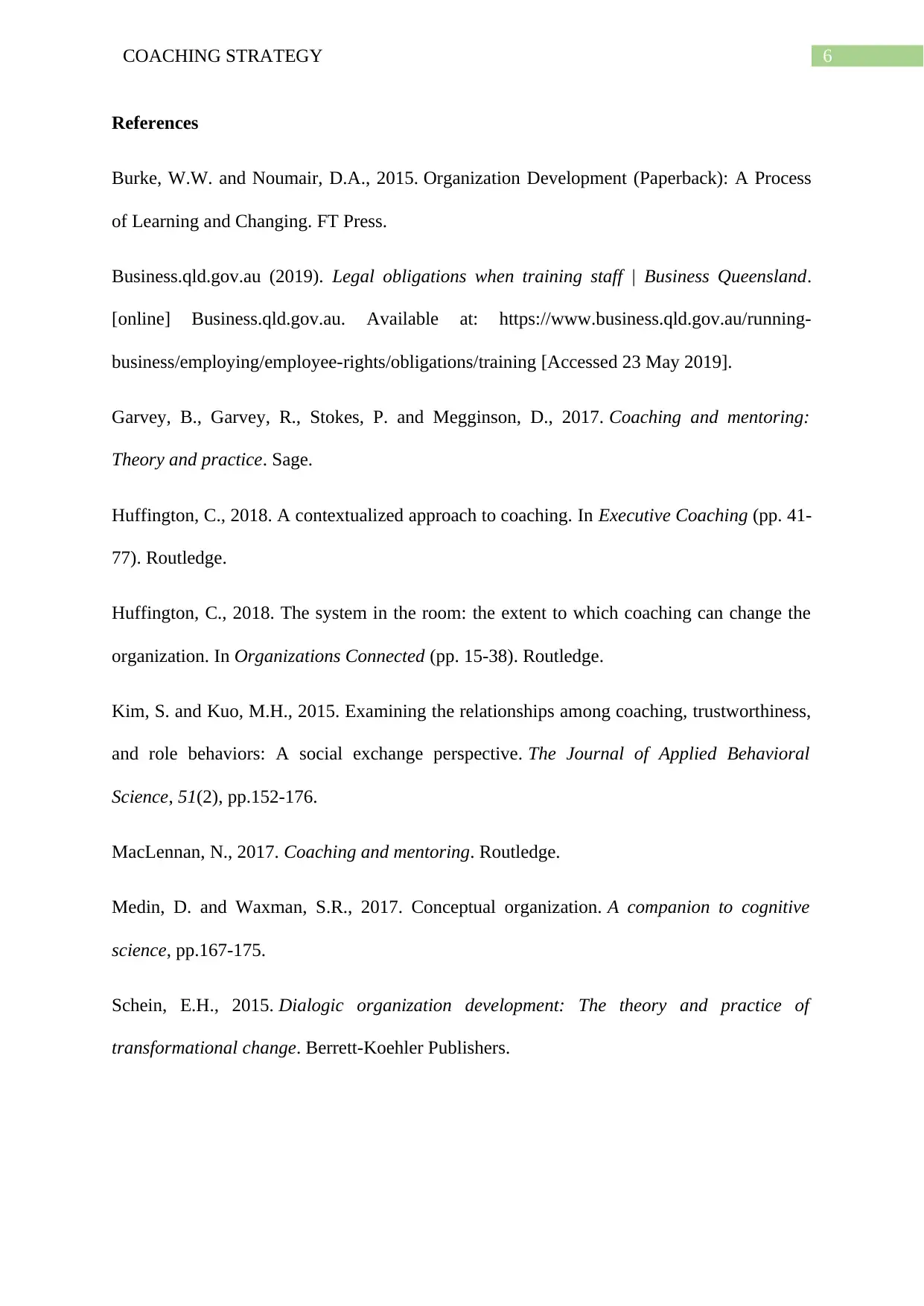
6COACHING STRATEGY
References
Burke, W.W. and Noumair, D.A., 2015. Organization Development (Paperback): A Process
of Learning and Changing. FT Press.
Business.qld.gov.au (2019). Legal obligations when training staff | Business Queensland.
[online] Business.qld.gov.au. Available at: https://www.business.qld.gov.au/running-
business/employing/employee-rights/obligations/training [Accessed 23 May 2019].
Garvey, B., Garvey, R., Stokes, P. and Megginson, D., 2017. Coaching and mentoring:
Theory and practice. Sage.
Huffington, C., 2018. A contextualized approach to coaching. In Executive Coaching (pp. 41-
77). Routledge.
Huffington, C., 2018. The system in the room: the extent to which coaching can change the
organization. In Organizations Connected (pp. 15-38). Routledge.
Kim, S. and Kuo, M.H., 2015. Examining the relationships among coaching, trustworthiness,
and role behaviors: A social exchange perspective. The Journal of Applied Behavioral
Science, 51(2), pp.152-176.
MacLennan, N., 2017. Coaching and mentoring. Routledge.
Medin, D. and Waxman, S.R., 2017. Conceptual organization. A companion to cognitive
science, pp.167-175.
Schein, E.H., 2015. Dialogic organization development: The theory and practice of
transformational change. Berrett-Koehler Publishers.
References
Burke, W.W. and Noumair, D.A., 2015. Organization Development (Paperback): A Process
of Learning and Changing. FT Press.
Business.qld.gov.au (2019). Legal obligations when training staff | Business Queensland.
[online] Business.qld.gov.au. Available at: https://www.business.qld.gov.au/running-
business/employing/employee-rights/obligations/training [Accessed 23 May 2019].
Garvey, B., Garvey, R., Stokes, P. and Megginson, D., 2017. Coaching and mentoring:
Theory and practice. Sage.
Huffington, C., 2018. A contextualized approach to coaching. In Executive Coaching (pp. 41-
77). Routledge.
Huffington, C., 2018. The system in the room: the extent to which coaching can change the
organization. In Organizations Connected (pp. 15-38). Routledge.
Kim, S. and Kuo, M.H., 2015. Examining the relationships among coaching, trustworthiness,
and role behaviors: A social exchange perspective. The Journal of Applied Behavioral
Science, 51(2), pp.152-176.
MacLennan, N., 2017. Coaching and mentoring. Routledge.
Medin, D. and Waxman, S.R., 2017. Conceptual organization. A companion to cognitive
science, pp.167-175.
Schein, E.H., 2015. Dialogic organization development: The theory and practice of
transformational change. Berrett-Koehler Publishers.
1 out of 7
Related Documents
Your All-in-One AI-Powered Toolkit for Academic Success.
+13062052269
info@desklib.com
Available 24*7 on WhatsApp / Email
![[object Object]](/_next/static/media/star-bottom.7253800d.svg)
Unlock your academic potential
Copyright © 2020–2025 A2Z Services. All Rights Reserved. Developed and managed by ZUCOL.




